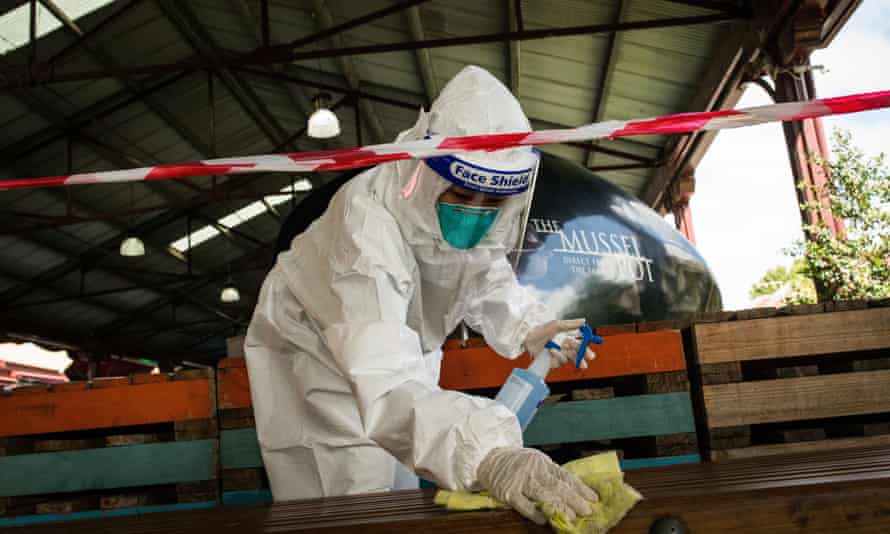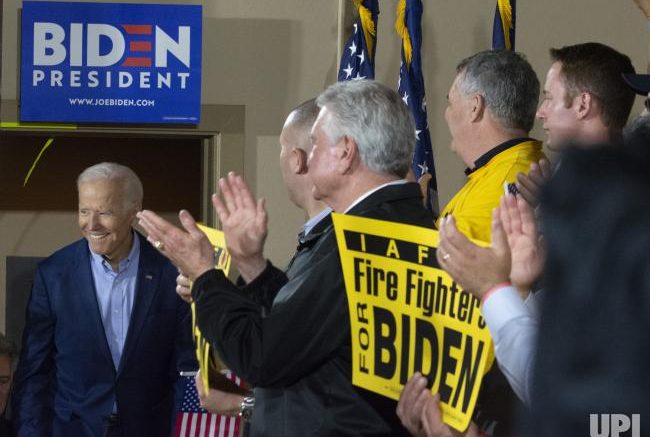Clean break: the risk of catching Covid from surfaces overblown, experts say
Prioritising eye protection and face masks will prevent the spread of coronavirus more than disinfecting surfaces, research shows

An epidemiologist with La Trobe University, Associate Prof Hassan Vally, said just over one year later it has become clear surface transmission is not as significant a factor in Covid-19 spread as once feared. While surface transmission is not impossible, Vally said its role in spread needs perspective.
“I want to be clear that nothing should change in terms of washing our hands and personal hygiene,” Vally said. “We can, however, be less anxious about washing every surface 20 times a day, and just concentrate on good hand hygiene and social distancing, and staying home when sick, which should be more than enough to stop us from spreading the virus.”
Close contact aerosol spread is the driving factor in Covid-19 transmission, primarily when an infected person is in close contact with another person and transmit small liquid particles [droplets and aerosols] containing the virus, especially when they cough and sneeze. These aerosols then get into the nose, mouth and eyes of people nearby.
In a piece for the Conversation, Vally said: “This isn’t to say surface transmission isn’t possible and that it doesn’t pose a risk in certain situations, or that we should disregard it completely. But, we should acknowledge the threat surface transmission poses is relatively small.”
Emanuel Goldman, a professor of microbiology at Rutgers University in the US, wrote in medical journal the Lancet that studies warning of surface transmission had been conducted in the lab, and “have little resemblance to real-life scenarios”.
“In my opinion, the chance of transmission through inanimate surfaces is very small, and only in instances where an infected person coughs or sneezes on the surface, and someone else touches that surface soon after the cough or sneeze (within 1–2 hours),” Goldman said.
“I do not disagree with erring on the side of caution, but this can go to extremes not justified by the data.” Periodically disinfecting surfaces and use of gloves may be reasonable precautions in settings like hospitals, he said, but is probably overkill for less risky environments.
Fuelling the concern about surface spread were seemingly alarming but overblown studies, including one from the Australian government agency CSIRO that found a droplet of fluid containing the virus at concentrations similar to levels observed in infected patients could survive on surfaces such as cash and glass for up to 28 days.
What many of the news reports about the study failed to mention was that it was carried out in the dark to remove the effect of ultraviolet light which helps to kill viruses. Humidity and temperatures in the real world vary constantly, which is different to carefully controlled temperatures in a laboratory. Mail, for example, will go through different humidities and temperatures throughout the system and will also be exposed to light, making survival of the virus in the post extremely unlikely.
The science wasn’t wrong, Vally said, but the interpretation and explanation of the results was.
But isn’t too many hygiene measures better to be absolutely safe?
Vally said the issue was compliance fatigue.
“There’s been a lot of psychological research done that says that we only have a certain amount of willpower and a certain amount of detail that we can focus our attention on,” Vally said. “That’s why Apple founder Steve Jobs wore the same clothes every day, based on the idea you can only make so many decisions each day, and exercise certain amount of willpower.
“To me as we learn more about the virus, we should make sure we are not being worried about things we shouldn’t be worried about, we don’t want to focus our attention on things disproportionate to the threat that they pose. That way, we will have more energy to focus on the things that are important, and that helps us to save money and time as well.”
Peter Collignon, an infectious diseases physician and professor with the Australian National University, agreed all the available evidence says it’s people in close proximity with each other talking, coughing, singing and breathing heavily that drives virus spread.
“They’re breathing them in and it’s getting into their nose and eyes and that is the major risk factor,” he said. It’s why eye protection, particularly in quarantine hotels and hospitals, should be prioritised as much as masks and social distancing, he said.
Collignon cites a large study published in the Journal of the American Medical Association that found 19% of healthcare workers became infected, despite wearing three-layered surgical masks, gloves and shoe covers and using alcohol rub. After the introduction of face shields, no worker was infected.
“I think we’ve underappreciated how important the eyes are and overemphasised surfaces,” Collignon said.


/https://www.thestar.com/content/dam/thestar/business/2021/02/23/molson-playing-hard-ball-with-locked-out-brewery-workers-labour-advocate-says/beer_lockout.jpg)







